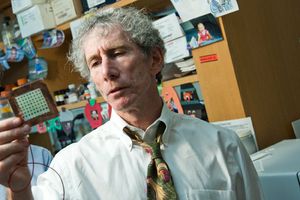Researcher Wins Award to Fight Breast Cancer, David Sherr’s Ignition Award for pioneering drug work
For cancer researcher David Sherr, the fight against the disease isn’t just professional. It’s personal. Sherr’s wife died from multiple myeloma a dozen years ago. Now the School of Public Health environmental health professor, Sherr, who is also a professor of pathology and laboratory science at BU School of Medicine, has received a BU Ignition Award to seek a breakthrough in treating and preventing breast cancer, one of his fields of research.

The $50,000 grant will fund research on a drug to inhibit AhR, a protein believed responsible for jump-starting some cancers and steering tumors toward malignancy. Sherr hopes to find an inhibitor drug that can stop AhR. Such a drug could halt some breast cancers from metastasizing while preventing others altogether. He says a drug could be ready for clinical trials in three to five years.
“About 10 percent of breast cancers are clearly attributable to inherited genes,” says Sherr. “The causes of the remaining 90 percent are unclear, but almost certainly reflect, in part, environmental exposures.” Researchers believe AhR plays a key part in inducing cancer by controlling the reaction of cells to pollutants such as PCBs, dioxins, and hydrocarbons . They also believe it can influence malignancy in tumors that result not just from chemical exposure, but from nonenvironmental causes as well.
Sherr’s collaborators are Jennifer Schlezinger, an SPH associate professor of environmental health, and Sarah Molina, director of screening for the High Throughput Screening Core <http://www.bu.edu/cores/cores/core-web-sites/high-throughput-screening-core/> , a central facility assisting University and Boston Medical Center researchers. Thus far, they have screened more than 3,000 chemical compounds, discovering 3 that seem to have some inhibiting effects on AhR
The University’s Office of Technology Development (OTD) awards Ignition grants twice a year to four BU researchers. Begun in the 2005-2006 academic year, the awards help researchers turn lab discoveries into practical products and services and are available to researchers in all fields. The Ignition program includes a venture capital advisory board that helps to review applications and work with winners.
“Dr. Sherr’s project has several things going for it,” says April Effort, OTD associate director of business development. “It’s interesting science and a novel approach to treating triple negative breast cancer , which is an area of high unmet medical need.” Triple negative breast cancer is a potentially aggressive variety that can be difficult to treat.
That is a particular issue for women of color battling the disease. “Triple-negative happens to be predominantly in the minority community,” Effort says.
Should a workable inhibitor emerge, Sherr says, he’ll likely need to partner with a drug company to test it. “It takes millions of dollars to get most new drugs into trial,” he says. “Only the pharmaceutical companies and venture capitalists have that kind of money.” AhR inhibitors might also be useful in preventing or treating prostate and lung cancer, sweetening their appeal to potential bankrollers, he says.
Indeed, Sherr says the biggest roadblocks to developing an inhibitor are financial and regulatory, not scientific. “The timing is all about logistics right now, not biology.”
This BU Today story was written by Rich Barlow. He can be reached at barlowr@bu.edu.